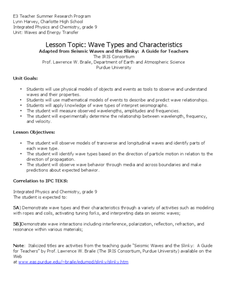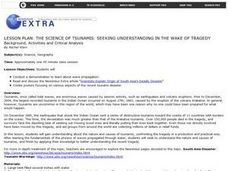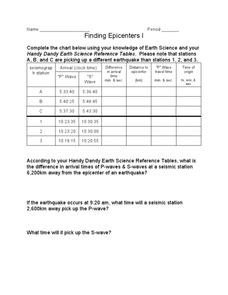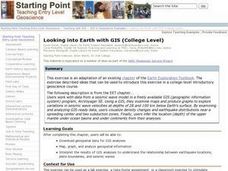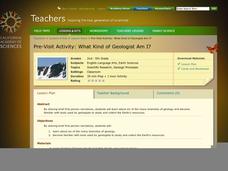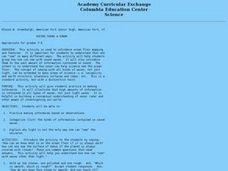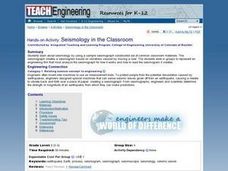Curated OER
Hazards: Fourth Grade Lesson Plans and Activities
Learn about damage associated with earthquakes and materials that best withstand a quake. A lab engages class members in the experimental design and construction of sturdy structures that can endure various earthquake...
Curated OER
Wave Types and Characteristics
Ninth graders identify the different parts of a wave. In this physics lesson, 9th graders observe wave behavior as it travels through a boundary. They determine the relationship between wavelength, frequency and velocity.
Curated OER
The Science of Tsunamis: Seeking Understanding in the Wake of Tragedy
Young scholars use Internet research, articles, discussion and models to explore the dynamics of a tsunami. They focus on the 2004 Asian Tsunami and create posters illustrating their understanding of this phenomenon.
Curated OER
Finding Epicenters 1
In this finding epicenters instructional activity, students complete a table given the "P" and "S" wave arrival times of 6 different earthquakes. Students calculate the difference in arrival time of the waves, the distance to the...
Curated OER
Looking into Earth with GIS
Students work with data from a seismic wave model in a freely available GIS (geographic information system) program, ArcVoyager SE. Using a GIS, they examine maps and produce graphs to explore variations in seismic wave velocities at...
Curated OER
Survival Still
Lead your class to construct a solar still on campus to demonstrate how water can be extracted from the soil. The power of solar energy is emphasized, as is the concept of how capillary water can be recovered and purified by using a...
Curated OER
Hazards: Fifth Grade Lesson Plans and Activities
After comparing earthquake and volcanic hazards to one another, fifth graders take a closer look at damage associated with a volcanic eruption. They then create a simulation of mudslides due to a volcanic eruption. Using different...
California Academy of Science
What Kind of Geologist Am I?
Transform your class into young geologists as they learn about six different branches of geology. Using the included geology career descriptions and picture cards, learners work in small groups deciding which tools and locations fit...
Curated OER
Incorporating 3D Visualizations into Your Classroom
Students make observations through 3-D visualizations. They explore scientific and geologic processes through the use of 3-D pictures.
Curated OER
Locate-a-quake
Student, use seismic readings of the same earthquake from three recording stations and locate the epicenter of an earthquake on a map.
Curated OER
Forces in Earth
In this Earth's forces worksheet, students will review the characteristics of earthquakes, including types of faults. Students will interpret a seismograph read-out from an earthquake. Students will complete 10 fill in the blank...
Curated OER
Earthquakes: Kindergarten Lesson Plans and Activities
Beginning with a pre-lab, kindergarteners trace the letters in the word earthquake and discuss what happens in an earthquake. The lab portion allows young scientists realize that earthquakes trigger shaking of different intensities...
Curated OER
Electromagnetic Spectrum
Students define electromagnetic radiation, list major categories and uses of electromagnetic waves, identify potential health risks with electromagnetic waves, and demonstrate understanding of Plank's constant by solving quantitative...
Curated OER
Virtual Earthquake
Students visit a website that features online interactive geology and biology simulations. They observe and estimate the amplitude of the largest wave and transfer the information to a nomogram. Based on the nomogram students will...
Curated OER
Circles
Tenth graders explore and define the radius and diameter of a circle. In this geometry lesson, 10th graders calculate the circumference and area of a circle using real world objects and shapes. They discuss chords and lines tangent...
Curated OER
Earthquake Power
In this earthquakes worksheet, students learn about the measurements of earthquakes on the Richter scale. They answer six questions about the magnitudes and sizes of earthquakes using two tables of data about earthquakes and the Richter...
Curated OER
Seeing Sound and Sonar
Young scholars grasp how underwater animals can "see" using sound waves. They practice making inferences, and build a conceptual understanding of sonar radar.
Curated OER
Hazards: Kindergarten Lesson Plans and Activities
The last unit in the series allows kindergarteners to see the dangers and hazards associated with each of the natural disasters learned so far in the series—earthquakes and volcanoes. They listen to sounds associated with the...
Curated OER
Tomography
In this tomography activity, students read about how tomography is used to help oceanographers learn more about the Earth's surface below the ocean. Students complete 3 short answer questions based on the reading.
Curated OER
Earthquake on the Playground
Students investigate earthquakes by examining chart data. In this disasters instructional activity, students identify the waves that are recorded when an earthquake arises by reading sample graphs in class. Students...
Curated OER
Finding an Earthquake's Epicenter
High schoolers examine the process used to identify the epicenter of an earthquake. They identify the Richter scale and interpret a seismograph reading. They also view photographs of the aftermath of earthquakes.
Curated OER
Seismology in the Classroom
Students work together to use a sample seismograph. They role play the position of an engineering firm that is to analyze the machine. They discover how engineers develop new machines to take measurements.
Curated OER
Earthquake Science Project
Students simulate the Earth's plates moving like an earthquake by using newspaper and soil. In this earthquake lesson plan, students push and pull the newspaper together that has soil on top and observe what happens.
Curated OER
Roots of the Hawaiian Hotspot
Students explain the processes of plate tectonics and volcanism that resulted in the formation of the Hawaiian Islands. They describe, compare, and contrast S waves and P waves. They explain how



